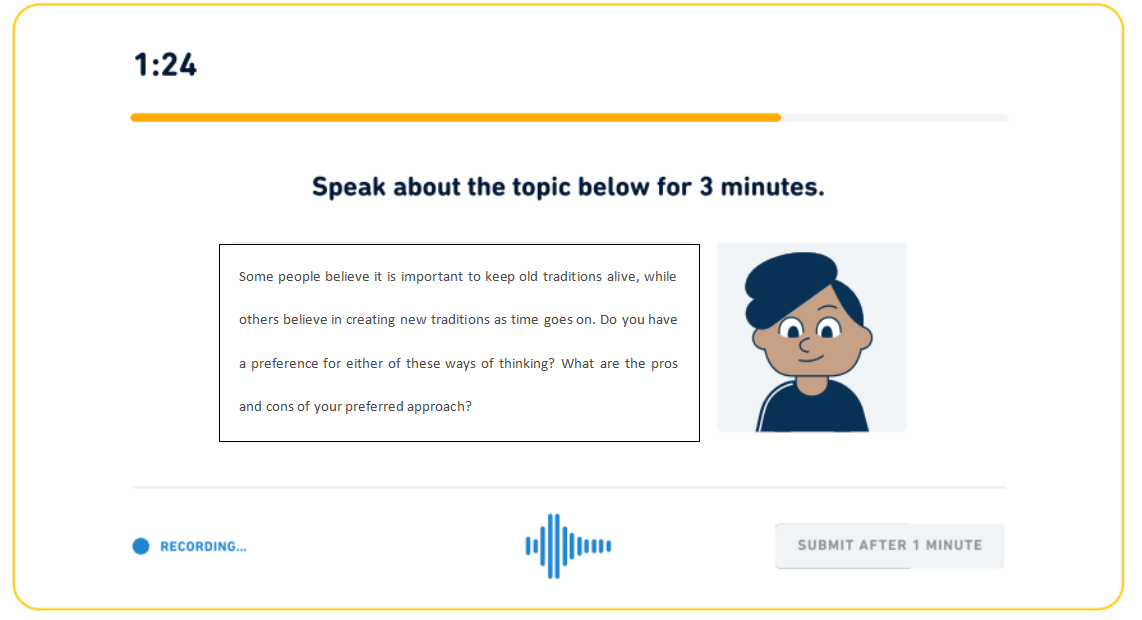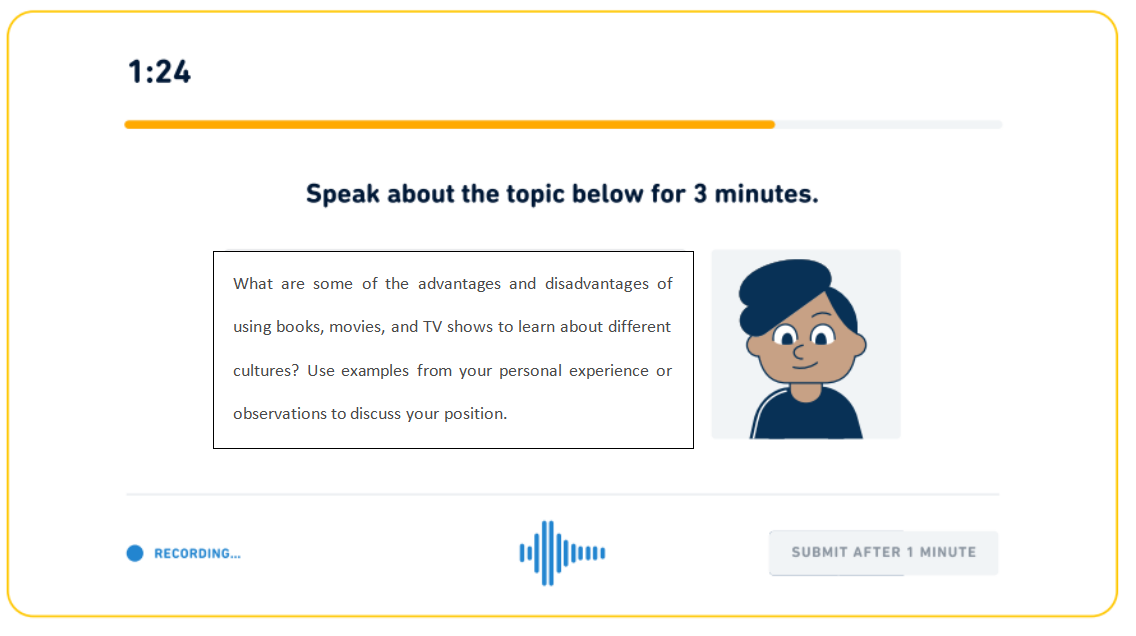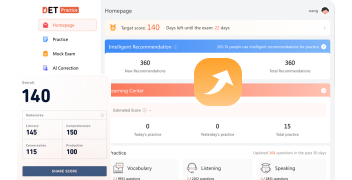DET Antworten auf Fragen mit hoher Schwierigkeit: 'Sprechprobe' (2024.10.24)
Der Abschnitt 'Speaking Sample' des Duolingo Englischtests (DET) erfordert, dass die Kandidaten ihre Meinungen zu einem bestimmten Thema innerhalb von drei Minuten klar ausdrücken. Dieser Abschnitt bewertet Flüssigkeit, Genauigkeit, Aussprache, Wortschatz und die Kohärenz der Ideen. Hier teilen wir effektive Strategien und Beispielantworten, um Ihnen zu helfen, in diesem Teil des Tests zu glänzen.

Strategien für hohe Punktzahlen im DET Speaking Sample
1. Verstehen Sie das Thema und planen Sie schnell
Nehmen Sie sich vor dem Sprechen einen Moment Zeit, um das Thema vollständig zu verstehen und eine kurze Struktur zu skizzieren. Ein Format wie “Punkt, Unterstützung, Schlussfolgerung” funktioniert gut: Beginnen Sie mit Ihrer Hauptidee, folgen Sie mit unterstützenden Details oder Beispielen und enden Sie mit einer kurzen Zusammenfassung. Bei narrativen Antworten verwenden Sie die chronologische Reihenfolge, um eine logische und leicht nachvollziehbare Antwort zu erhalten.
2. Halten Sie eine klare Struktur und logischen Fluss aufrecht
Eine gut organisierte Struktur und logischer Fluss helfen Ihrem Zuhörer, Ihrer Antwort zu folgen. Wenn Sie beispielsweise gebeten werden, “describe an interesting travel experience,” organisieren Sie Ihre Antwort, indem Sie den Ort, die Aktivitäten und die Eindrücke der Reihe nach beschreiben. Vermeiden Sie es, zwischen den Punkten zu springen oder Ideen zu wiederholen, da eine strukturierte Antwort ansprechender und leichter nachvollziehbar ist.
3. Verwenden Sie vielfältigen Wortschatz und minimieren Sie Wiederholungen
Versuchen Sie innerhalb der erlaubten Zeit, ein breites Spektrum an Wortschatz zu zeigen, insbesondere durch die Verwendung variierter Verben, Adjektive und beschreibender Wörter. Vermeiden Sie es, grundlegende Begriffe wie “good” oder “interesting” zu wiederholen und entscheiden Sie sich für Synonyme oder spezifischere Begriffe wie “fascinating” oder “memorable”, um Ihrer Antwort Tiefe zu verleihen.
4. Gewährleisten Sie Flüssigkeit und natürliche Geschwindigkeit
Halten Sie ein moderates Sprechtempo, vermeiden Sie übermäßig langsames Sprechen oder das Hineinstürzen aufgrund von Nervosität. Ein natürlicher Rhythmus zeigt Flüssigkeit und kleine Fehler sind kein Problem, wenn sie den Fluss Ihrer Antwort nicht unterbrechen.
5. Üben Sie Aussprache und Intonation
Klare Aussprache und natürliche Intonation sind entscheidend für eine hohe Punktzahl. Regelmäßiges Zuhören von Muttersprachlern und Nachahmung ihrer Aussprache und Intonation, insbesondere bei Schlüsselwörtern und Satzendungen, kann helfen. Eine Anpassung Ihres Tons zur Betonung Ihrer Punkte kann Selbstvertrauen in Ihre Antwort bringen und sie ansprechender machen.
Beispielfragen und -antworten mit hohem Schwierigkeitsgrad
Das 'Speaking Sample' ist eine objektive Frage. Beim Beantworten dieses Fragetypus sollten die Kandidaten einen flexiblen Ansatz verfolgen. Im Folgenden finden Sie zwei fortgeschrittene Antworten. Wenn Sie mehr üben möchten, schauen Sie sich gerne das Video unten an.
Beispielfrage 1:

Beispielantwort:
That's an interesting question, and it really got me thinking. I believe there’s significant value in both preserving old traditions and creating new ones.
On one hand, keeping old traditions alive helps us connect with our roots and provides a deep sense of cultural identity. Celebrating holidays like Thanksgiving and Christmas not only brings families together but also fosters a collective sense of unity. Additionally, preserving these traditions allows us to learn from the wisdom and experiences of our ancestors, passing down valuable knowledge through generations.
On the other hand, creating new traditions is essential for adapting to our ever-evolving world. New traditions embrace change and offer exciting opportunities for self-expression and creativity, reflecting our modern values and circumstances.
In conclusion, I believe it’s crucial to strike a balance between preserving old traditions and creating new ones. This approach honors our heritage while allowing us to embrace change and progress in our lives.
Beispielfrage 2:

Beispielantwort:
There are both positives and negatives to learning about different cultures through books, movies, and TV shows.
On one hand, these media can be a fantastic window into diverse worlds, offering snapshots of cultural practices and beliefs we might not otherwise encounter. For example, reading "Memoirs of a Geisha" provided an enthralling view of Geisha culture in Japan, almost like stepping into another universe.
However, these portrayals can also perpetuate stereotypes and offer skewed or overly romanticized views. Many Hollywood films depict foreign cultures through a narrow lens filled with clichés. You can’t truly understand a culture just by watching a movie.
Additionally, narratives often dominate from a Western perspective, which may not accurately reflect the experiences of people from different cultures.
In essence, while media can spark our interest in other cultures, it's vital to approach them critically and seek out diverse sources for a more holistic understanding.
Weiterführende Literatur:
l DET Vorbereitungskurs: Fragen zu Speaking Samples
(Ein Artikel über einen umfassenden Kurs und Übungen zu Speaking Samples.)
l 10 Fortgeschrittene Vokabeln für “Writing Sample” im Duolingo Englischtest - persönliche Erfahrung
(Ein Artikel über fortgeschrittenen Wortschatz für Writing Samples.)
l DET 5 Hohe-Punktzahlen Beispiele Antworten: 'Writing Sample' (2024.09.28)
(Ein Artikel über hohe Punktzahlen bei Schreibproben.)






